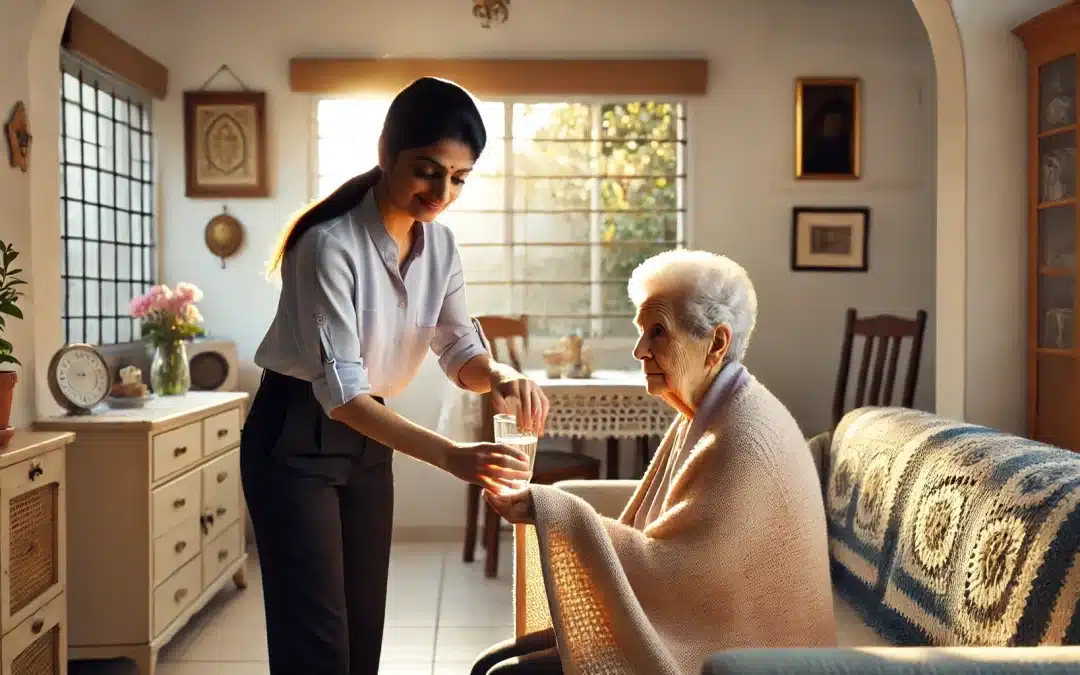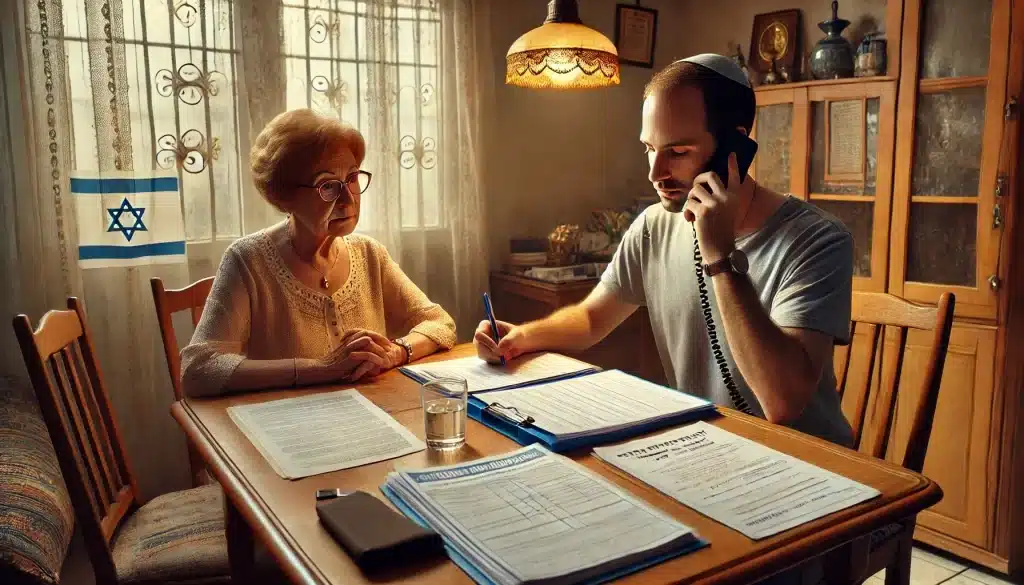
Jan 20, 2025
Having and managing a live-in caregiver for your elderly loved one is a significant life change that requires careful consideration and clear understanding of responsibilities. This guide, the final part in our three-part series on foreign caregivers in Israel, focuses on the essential aspects of maintaining a successful caregiving relationship after you’ve made your choice (Part 1) and completed the hiring process (Part 2).
To help you navigate this journey successfully, we’ve created a comprehensive Family Checklist for Managing a Foreign Caregiver that you can download, print, and use to track all necessary tasks – from initial setup through ongoing management (end of article). This checklist, combined with the detailed guidance in this article, will help ensure you don’t miss any crucial steps in managing your caregiving arrangement.
In this guide, we’ll walk you through everything you need to know about managing a foreign caregiver in Israel, from pre-arrival preparations to handling day-to-day situations and resolving potential conflicts. Whether you’re just starting this journey or looking to improve an existing caregiving arrangement, this guide provides the essential information and practical advice you need for long-term success.
Pre-Arrival Preparations: Setting the Foundation of Managing a Live-In Caregiver
Understanding Manpower Agencies (תאגידי כוח אדם)
According to Israeli law, every foreign caregiver must be registered with a licensed manpower agency. This requirement ensures proper oversight and protection for both the caregiver and the employing family.
Major licensed agencies in Israel include:
- A.B. Israeli Center for Caregivers (link)
- Ne’eman Foreign Workers for Nursing (link)
- M.S.D (Link)
A full list can be found in the following link
These agencies serve as the official mediator between the Population and Immigration Authority, the caregiver, and the employing family. Their services include:
- Assignment of a dedicated social worker who conducts mandatory periodic visits (1-2 times annually)
- Processing and renewal of work visas
- Handling required documentation with government authorities
- Providing guidance on legal rights and obligations
- Offering mediation services for conflict resolution
- Monitoring the caregiving situation to ensure compliance with regulations
Annual agency fees typically range from 2,000 to 2,500 NIS, which are paid by the employing family.
Medical Insurance and Healthcare Setup for Managing a Live-In Caregiver
Medical insurance is mandatory for foreign caregivers. According to Israeli law, the caregiver is legally responsible for paying this cost, which typically ranges from 120-180 NIS monthly. However, many families choose to cover this expense to ensure continuous and proper healthcare coverage, even though they are not legally obligated to do so.
Major providers include:
- Harel Insurance (through Shirbit)
- Menora Mivtachim
- Phoenix
Important Healthcare Tips:
- Register the caregiver with the same healthcare provider (קופת חולים), branch (סניף), and primary physician (רופא) as the senior
- This alignment significantly streamlines medical appointments and prescription management
- Ensures better coordination of care between the caregiver and healthcare providers
Basic insurance coverage includes:
- Emergency medical care
- Hospitalization
- Prescription medications
- Basic dental care
Communication Systems Setup
Effective communication requires proper infrastructure:
- Mobile Communication:
- Caregiver needs an Israeli phone number
- Cost responsibility lies with the caregiver
- Recommended providers: Golan Telecom, 019 Mobile, Partner
- Family Communication Framework:
- Create a dedicated WhatsApp group including: Primary family contacts, The caregiver, Healthcare providers when relevant
- Set clear communication guidelines
- Establish emergency contact protocols
Real-World Example: The Cohen family created a WhatsApp group named “Grandpa David Care” including their father’s caregiver and three adult children. They established rules for urgent messages (using the 🚨 emoji) versus routine updates, making communication efficient and clear for all parties involved. The group helps coordinate daily care activities, share updates about medical appointments, and ensure everyone stays informed about Grandpa David’s well-being.

Preparing Your Home and First Days Together
Creating a Welcoming Environment for Managing a Live-In Caregiver
The initial home setup is crucial for establishing a positive long-term caregiving relationship. Remember, your caregiver will be living in your loved one’s home 24/7, making their personal space essential for both comfort and work efficiency. A well-prepared, clean home with dedicated private space for the caregiver demonstrates respect and consideration, setting the foundation for a harmonious relationship.
Home Setup Requirements
Private Room Requirements:
- Clean, well-ventilated room with a window
- Bed and clean bedding
- Closet or wardrobe for personal belongings
- Small desk or table (recommended)
- Access to bathroom facilities
- Fan or air conditioning (especially important during summer)
- Basic lighting and electrical outlets
- Lock for privacy (if possible)
Shared Spaces Setup:
- Clear space in refrigerator for personal food items
- Kitchen storage space for personal belongings
- Access to laundry facilities
- House keys
- Written emergency contact list in clear view
- Basic household orientation guide
First Days Together – Building Relationships and Understanding
The initial days are critical not just for technical orientation but for building trust and understanding between all parties involved. This period sets the tone for the entire caregiving relationship. Take time to:
- Allow the caregiver and senior to get acquainted gradually
- Share family stories and photos to help the caregiver understand your loved one better
- Discuss preferences, habits, and daily routines
- Address any special care requirements openly
Special Care Considerations:
- For seniors with dementia:
- Explain specific behaviors and triggers
- Share successful communication techniques
- Provide detailed safety protocols
- Discuss wandering prevention strategies
- For seniors with physical limitations:
- Demonstrate proper transfer techniques
- Explain pain management routines
- Share exercise or therapy schedules
- Review mobility aid usage
Outside Orientation
Familiarize your caregiver with:
- Local grocery stores and supermarkets
- Nearest pharmacy
- Public transportation stops
- Senior clubs and community centers where seniors gather for activities
- Local parks or meeting places where both seniors and caregivers socialize
- Medical facilities (קופת חולים) location
- Nearby synagogue or place of worship (if relevant)
- Post office and other essential services
Real-World Example: “When Ana arrived, we spent the first morning walking around the neighborhood. We showed her the local Supersol where we usually shop, introduced her to the pharmacist at Super-Pharm who handles mom’s prescriptions, and showed her the local park where both seniors and caregivers often meet to chat and socialize. This orientation helped her feel more connected to the community and gave mom an opportunity to maintain her social connections.”

Managing Day-to-Day Care
Navigating the Initial Transition Period of Managing a Live-In Caregiver
The introduction of a live-in caregiver into a senior’s home marks a significant life change for everyone involved. For seniors receiving care for the first time, this transition can be particularly challenging as they grapple with feelings of lost independence and privacy concerns. Even those who have had previous caregivers may struggle, often comparing new caregivers to past ones or having preset expectations that may not align with reality.
Common Initial Challenges:
- Seniors feeling threatened by loss of independence
- Privacy adjustments and sharing living space
- Building trust between caregiver and senior
- Family members learning their new roles
- Establishing new daily routines
To ease this transition, maintain open dialogue and respect the senior’s need for control over certain aspects of their daily life. Remember that trust and comfort develop gradually – rushing this process rarely leads to positive outcomes.
Medical Care and Medication Management
One of the most critical aspects of senior care is proper medication management. While caregivers play a vital role in day-to-day care, the primary responsibility for medication management should typically rest with a designated family member.
Key Responsibilities: Family Member:
- Managing prescription schedules and renewals
- Communicating with healthcare providers
- Ensuring adequate medication supply
- Overseeing any changes in medication
Caregiver’s Role:
- Following established medication schedule
- Documenting each administration
- Reporting side effects or concerns
- Monitoring daily health changes
Financial Management
Managing finances in a caregiving relationship requires careful consideration and clear boundaries. As a general rule, caregivers should have minimal direct financial interactions with the senior. Instead, a designated family member should oversee all financial aspects of care.
Best Practices for Financial Management:
- Designate one family member as financial manager
- Establish clear purchasing protocols
- Keep detailed records of all expenses
- Maintain a small emergency fund for caregiver use
- Review receipts and expenses regularly
Real-World Example: “In our family, my brother handles the weekly grocery shopping, while I manage medical supplies and prescriptions. Our caregiver has access to a small emergency fund, but every purchase is documented with receipts that we review weekly. This system prevents any confusion or potential conflicts about money.”
Break Time and Rest Periods
While Israeli law mandates specific rest periods for caregivers, including a weekly 24-hour break, many caregivers prefer alternative arrangements such as shorter daily breaks. This flexibility can work well, but requires careful planning and monitoring.
Break Time Considerations:
- Assess senior’s ability to be alone safely
- Set clear break schedules and duration
- Establish check-in protocols
- Have emergency contacts readily available
- Monitor adherence to agreed schedules
For daily breaks (typically 2 hours), ensure:
- Break timing works with senior’s routine
- Senior has emergency contact means
- Clear start and end times are established
- Regular review of arrangement effectiveness
The key to successful break management is finding the right balance between caregiver needs and senior safety. Regular communication about these arrangements helps ensure they continue to work for everyone involved.

Understanding Legal Rights and Challenges of Managing a Live-In Caregiver
Employment Rights and Obligations
Foreign caregivers in Israel are protected by specific labor laws that establish their rights and working conditions. Understanding these regulations is crucial for maintaining a proper and legal employment relationship. While detailed salary calculations can be found in our salary calculation guide, here are the key elements you need to manage:
Basic Rights Overview:
- Monthly salary (as per current regulations)
- Weekly rest period (minimum 24 hours)
- Annual vacation days
- Sick leave
- Holiday allowance
- Pension contributions
- Recuperation pay (דמי הבראה)
Planning for Annual Vacation
Foreign caregivers typically take a one-month vacation annually, usually during summer, to visit their homeland. This extended break combines both paid annual leave and unpaid leave, as the standard annual vacation allowance doesn’t cover the entire month. The number of paid vacation days depends on the caregiver’s years of service (ותק):
- First year: 14 paid vacation days
- 2-3 years: 16 paid vacation days
- 4-5 years: 18 paid vacation days
- 6+ years: 21 paid vacation days
For example, if a caregiver who has worked for two years takes a month-long vacation (30 days), 16 days would be paid vacation days, while the remaining 14 days would be unpaid leave. This arrangement should be clearly documented in the employment contract and discussed in advance. The vacation requires careful advance planning, particularly regarding visa arrangements and finding a suitable temporary replacement (reliever).
Key Vacation Planning Considerations:
- Begin planning several months in advance
- Arrange return visa documentation
- Secure a reliable reliever caregiver
- Coordinate handover periods
While technically the responsibility for finding a reliever falls to the regular caregiver, in practice, this often becomes the family’s responsibility. Finding a suitable reliever can be challenging as they are typically foreign caregivers whose regular work permits have expired, making them highly sought after, especially during popular vacation periods.
Pro Tip: Consider engaging professional assistance, such as HappySeniors or similar care management services, to help secure a reliable reliever. Their expertise and connections can significantly reduce the stress of finding temporary coverage.
Managing Conflicts and Challenges
Caregiving relationships can face various challenges that require careful handling and professional intervention. Three primary sources of conflict often emerge:
- Misaligned Expectations: The gap between family expectations and caregiver duties can create tension. Clear communication about responsibilities, working hours, and care standards is essential from the start.
- Daily Living Conflicts: Living together 24/7 can strain relationships between seniors and caregivers. Seniors may exhibit challenging behaviors, especially those with conditions like dementia that can lead to verbal abuse or even violence. Conversely, caregivers might have strong personalities or different living habits that clash with the senior’s preferences.
- Fundamental Compatibility Issues: Sometimes, despite best efforts, there might simply be a poor fit between the caregiver and senior, requiring a change in caregiver.
The Importance of Professional Mediation for Managing a Live-In Caregiver
Many families find it challenging to handle caregiving conflicts effectively. With their own life pressures and limited time, they often hope the caregiving arrangement will be “fire-and-forget.” However, this approach can lead to deteriorating situations and increased stress for all parties.
While manpower agencies provide basic oversight, they typically don’t offer comprehensive conflict resolution services as part of their standard package. For this reason, engaging a private social worker or case manager can be invaluable. These professionals offer:
- Unbiased mediation
- Extensive experience in conflict resolution
- Regular monitoring of the caregiving relationship
- Professional intervention before situations escalate
- Practical solutions based on experience’
Real-World Example: “We initially tried handling conflicts with our caregiver directly, leading to tense confrontations and stress for everyone involved. After engaging a professional case manager, they helped resolve the issues by understanding both sides’ perspectives and implementing practical solutions. Their calm, professional approach transformed what had been a deteriorating situation into a stable, positive caregiving relationship.”
Support Resources
Several professional resources are available for managing caregiver relationships:
- Private Case Managers/Social Workers
- Provide ongoing monitoring and support
- Offer professional conflict resolution
- Help maintain stable caregiving relationships
- Kav LaOved (קו לעובד)
- Phone: 03-6883766
- Workers’ rights guidance and support
- Ministry of Labor (משרד העבודה)
- Official oversight and regulations
- Labor law compliance guidance
Remember that investing in professional case management services can prevent many common caregiving challenges and provide peace of mind for both families and caregivers.

Keys to Long-term Success for Managing a Live-In Caregiver
Building a Sustainable Care Environment
Creating a successful long-term caregiving relationship requires ongoing attention and proactive management. This final section of our guide focuses on essential practices that help maintain a stable and positive caregiving environment.
Regular Review and Assessment
Schedule periodic evaluations of the caregiving arrangement to ensure it continues meeting everyone’s needs. Monthly family meetings can help address concerns before they become problems and maintain clear communication channels between all parties.
Key Review Areas:
- Senior’s health status and changing needs
- Caregiver’s wellbeing and job satisfaction
- Care plan effectiveness
- Communication effectiveness
- Required adjustments to routines or responsibilities
Professional Support Network for Managing a Live-In Caregiver
Maintaining a strong professional support network is crucial for long-term success. This network should include:
- Primary Care Physician
- Case Manager/Social Worker
- Specialist Healthcare Providers
- Support Groups (for both family and caregiver)
- Emergency Backup Caregivers
- Agency Contacts
Maintaining Healthy Boundaries
Long-term caregiving relationships often become quite personal, making it important to maintain appropriate professional boundaries while still fostering a caring environment.
Best Practices:
- Keep roles and responsibilities clear
- Maintain consistent work schedules
- Respect private time and space
- Address issues promptly and professionally
- Document important decisions and changes
Real-World Example: “After three years with our caregiver, we’ve learned that regular monthly meetings with our case manager help maintain a balanced relationship. We discuss any concerns openly, adjust care plans as needed, and ensure everyone’s needs are being met. This proactive approach has helped us avoid many potential problems.”
Signs That Changes May Be Needed
Be alert to signs that the current caregiving arrangement may need adjustment:
Warning Signs:
- Declining care quality
- Increased conflicts or tension
- Changes in senior’s health needs
- Caregiver burnout symptoms
- Communication breakdowns
Final Recommendations for Managing a Live-In Caregiver
Based on our experience helping numerous families manage their caregiving relationships, we recommend:
- Stay Proactive: Don’t wait for problems to emerge before seeking support or making adjustments.
- Invest in Professional Support: The cost of professional case management is often far less than the expense and stress of frequent caregiver changes or crisis management.
- Maintain Clear Documentation: Keep records of schedules, agreements, and any changes to the care plan.
- Focus on Prevention Regular: check-ins and open communication can prevent many common caregiving challenges.
- Value the Relationship: Remember that a positive caregiving relationship benefits everyone – the senior, the family, and the caregiver.
Conclusion
Managing a live-in caregiver relationship successfully requires dedication, clear communication, and proper support systems. While it may seem overwhelming at first, following the guidelines in this series of articles can help you create and maintain a stable, positive caregiving environment that benefits everyone involved.
Remember that you’re not alone in this journey. Professional support is available and can make a significant difference in the success of your caregiving arrangement. For more information about managing foreign caregivers in Israel, contact HappySeniors for professional guidance and support.
Professional Support for Your Managing a Live-In Caregiver Journey
Managing a caregiving relationship is a complex and ongoing process that requires attention, understanding, and often professional guidance. As we’ve seen throughout this series of articles, various challenges can arise at different stages of the caregiving journey – from initial setup to daily management and conflict resolution.
HappySeniors’ professional case management services can help you navigate these challenges effectively. Our experienced social workers provide comprehensive support, ensuring that both your loved one and their caregiver maintain a positive and productive relationship. We understand that each family’s situation is unique, and we tailor our support accordingly.
Our case management services include:
- Regular monitoring and assessment of the caregiving relationship
- Professional mediation and conflict resolution when needed
- Guidance with administrative and bureaucratic requirements
- Assistance in finding suitable replacement caregivers during vacations
- Ongoing support for both families and caregivers
We invite you to contact us for professional guidance and support:
Remember that investing in professional case management can prevent many common caregiving challenges and provide peace of mind for everyone involved in the caregiving relationship.
Family Checklist for Managing a Live-In Caregiver
Initial Setup (Before Caregiver Arrival)

Dec 22, 2024
Have you already decided that Finding a live-in caregiver is the right choice for your loved one? Whether you’re continuing your journey from our previous guide on deciding to hire a caregiver or just starting your research, you’re in the right place.
New to the caregiving journey? We strongly recommend starting with our previous guide first. It will help you understand if Finding a live-in caregiver is the right choice for your situation and walk you through the important initial decisions.
Already read our first guide? Welcome back! Now that you’ve made the decision to hire a caregiver, this guide will walk you through the crucial next steps – finding, interviewing, and Finding the right person for your loved one.
Introduction
Finding the right caregiver for your loved one is one of the most crucial decisions you’ll make in their care journey. This guide focuses specifically on the recruitment process – how to find, interview, and hire a foreign live-in caregiver in Israel. We’ll explore the entire process, from initial search to final hiring, ensuring you have all the information needed to make informed decisions at each step.
Why This Guide Matters?
The relationship between a caregiver, the senior, and their family is complex and multifaceted. Foreign caregivers take on this challenging work primarily as an economic opportunity, earning significantly more than they could in their home countries. The reality is that providing 24/7 care is incredibly demanding, especially when caring for seniors with physical disabilities, cognitive impairments, or other health challenges.
Adding to this complexity is the fact that many seniors may not be able to fully articulate their needs or provide accurate feedback about their potential caregiver. This makes the selection process particularly critical – it requires careful consideration not just of skills and experience, but also of personality fit and long-term sustainability of the caregiving relationship.
What This Guide Covers?
In this comprehensive guide, we will:
- Compare hiring an experienced foreign caregiver already in Israel versus bringing a new caregiver from abroad
- Walk through the different methods of finding and screening potential caregivers
- Provide detailed guidance on the interview process
- Explain the finding a live-in caregiver procedures and legal requirements
- Outline the costs and financial assistance options available
Timeframes to Consider
When planning to hire a caregiver, it’s important to understand the typical timeframes:
- Hiring an experienced caregiver already in Israel: Usually takes 2 – 4 weeks, depending on the caregiver’s availability and current employment situation
- Bringing a new caregiver from abroad: Typically requires 6 – 12 weeks, including visa processing, travel arrangements, and orientation
A Note on Caregiver Origins
Foreign caregivers in Israel primarily come from several regions: Eastern Europe (particularly former Soviet Union countries), South Asia (primarily India and Nepal), Southeast Asia (predominantly the Philippines) ,Other regions as approved by Israeli immigration authorities. Each region brings its own cultural background, work approach, and typical skill sets to the caregiving relationship.
Let’s proceed through each stage of the recruitment process, ensuring you have the knowledge and tools to make the best choice for your family’s specific needs.
Understanding Your Finding a Live-in Caregiver Options
When Finding a Live-in caregiver in Israel, you’ll typically choose between two main paths: hiring an experienced caregiver who is already working in Israel or bringing a new caregiver from abroad. Each option comes with its own set of advantages and considerations that need to be carefully weighed against your specific situation.
Experienced Caregivers Already in Israel
These are foreign caregivers who have already worked with one or more Israeli families. Here’s what you need to consider:
| Advantages |
Important Considerations |
| Familiarity with Israeli culture and healthcare system |
Generally command higher salaries due to experience |
| Experience navigating local medical facilities |
May have specific preferences about work conditions |
| Basic Hebrew language skills |
Often more selective about their placements |
| Can typically start work more quickly |
Might prefer less physically demanding cases |
| Understanding of local customs and expectations |
Could have established work patterns that are harder to modify |
| Established references from Israeli families |
Limited availability as they’re usually employed |
| No adaptation period needed |
May have specific requirements about who they work with |
Finding a Live-in Caregiver from Abroad
| Advantages |
Important Considerations |
| Larger pool of candidates to choose from |
Longer process (6-12 weeks) for visa and arrival |
| More flexibility in matching to your needs |
Need time to adjust to Israeli culture and systems |
| Often more adaptable to your family’s routines |
May require more guidance and support initially |
| Generally more accepting of various work conditions |
Language barriers might be more pronounced |
| Available for immediate long-term commitment |
Training levels can vary significantly |
| More competitive initial salary expectations |
Need time to learn the local healthcare system |
| Fresh energy and motivation for the role |
Cultural adaptation period required |
Bridging the Waiting Period
If you decide to bring a new caregiver from abroad, the waiting period (6-12 weeks) can be challenging. One common solution is to arrange for a temporary reliever caregiver who can provide care during this transition period. This option will be discussed in detail in the following sections of this guide.
Making Your Choice Finding a Live-in Caregiver
The decision between these options often depends on several key factors:
- Urgency of Need
- Immediate need might favor experienced caregivers
- Planned future need allows time for bringing someone from abroad
- Level of Support You Can Provide
- New caregivers need more initial guidance
- Experienced caregivers require less orientation
- Care Requirements
- Complex medical needs might benefit from experienced care
- Basic care needs might work well with either option
- Long-term Plans
- Consider the potential length of employment
- Think about future care needs and adaptability
Remember that regardless of which option you choose, the success of the caregiving relationship depends largely on proper matching, clear communication of expectations, and ongoing support for both the caregiver and your loved one.
Finding a Caregiver: Methods and Processes
The process of finding a foreign caregiver in Israel varies significantly depending on whether you’re looking for someone who is already in Israel or bringing a new caregiver from abroad. Each path has its own unique requirements, challenges, and considerations.
Finding a Live-in Caregiver Caregiver Already in Israel
When searching for a caregiver who is already in Israel, you have two main options: conducting a private search or working with professional agencies. Let’s examine both approaches in detail.
Private Search Process
While private searching gives you direct control over the process, it comes with significant challenges and time investments. Here’s what you need to know:
Online Platforms and Communities:
- Specialized Job Boards: Platforms specifically designed for caregiving positions in Israel: iSavta: A dedicated platform connecting families with caregivers, Helpbook: is a leading Israeli platform that connects families with caregivers for various needs, including senior and disabled care.
- Social Media Networks: Facebook Groups, WhatsApp Communities, Telegram Channels.
A private search can be overwhelming, challenging, and time-consuming for several reasons:
- You’ll need to screen numerous candidates, many of whom may not match your requirements
- Verifying credentials and work history requires significant effort and expertise
- Understanding labor laws and requirements can be complex
- Without experience, it’s difficult to evaluate caregiver competencies effectively
- The process can take weeks or months of active searching
- You may encounter language barriers during the screening process
- There’s a risk of missing important red flags that experienced professionals would catch
Professional Agency Assistance
Working with professional agencies like HappySeniors offers a comprehensive, guided approach that goes far beyond simple caregiver placement:
- Professional Assessment: A dedicated social worker case manager who:
- Conducts a thorough evaluation of your loved one’s needs
- Considers family dynamics and preferences
- Assesses the living environment and care requirements
- Helps define the ideal caregiver profile for your situation
- Comprehensive Matching Process:
- Access to a pre-screened database of qualified caregivers
- Background verification and reference checks
- Skills and experience validation
- Personality matching with your loved one
- Cultural compatibility assessment
- Administrative Support:
- Assistance with Bituach Leumi (National Insurance) applications
- Help securing available funding and benefits
- Guidance through all required paperwork
- Coordination with relevant authorities
- Ongoing Support:
- Regular monitoring of the caregiving situation
- Conflict resolution when issues arise
- Guidance for both family and caregiver
- Assistance with any necessary adjustments
- Support throughout the entire caregiving period
Bringing a Caregiver from Abroad
When bringing a caregiver from abroad, working with licensed agencies is not just recommended – it’s required. Here’s what you need to understand:
Agency Requirements
- Only licensed agencies can legally facilitate bringing foreign caregivers to Israel
- The process must comply with Israeli immigration and labor laws
- Agencies handle visa applications and necessary documentation
- Pre-arrival screening and preparation is conducted in the caregiver’s home country
Process Timeline and Steps
- Initial Consultation and Assessment
- Meeting with agency representatives
- Evaluation of care needs
- Documentation of requirements
- Financial arrangements discussion
- Candidate Selection
- Review of potential candidates
- Video interviews with shortlisted caregivers
- Background checks and credential verification
- Final selection and agreement
- Immigration Process
- Visa application and processing
- Travel arrangements
- Arrival coordination
- Initial orientation and setup
The Importance of Professional Guidance
Whether choosing a caregiver already in Israel or bringing someone from abroad, professional guidance offers significant advantages:
- Time and Stress Reduction: Professionals handle the complex processes while you focus on your loved one
- Risk Mitigation: Expert screening reduces the likelihood of unsuitable matches
- Comprehensive Support: Assistance extends beyond initial placement to ongoing care management
- Legal Compliance: Ensures all arrangements meet Israeli legal requirements
- Problem Resolution: Professional support for handling any issues that arise
- Resource Access: Connection to additional services and support systems as needed
The choice between finding a caregiver already in Israel or bringing someone from abroad depends on various factors, including urgency of need, specific care requirements, and long-term plans. Professional agencies like HappySeniors can help you evaluate these factors and choose the most appropriate path for your situation.
Finding a Live-in Caregiver: The Interview Process – Finding a Right Match
The interview process is perhaps the most crucial step in finding the right caregiver for your loved one. This is your opportunity to evaluate not just professional qualifications, but also the personal qualities that will make the caregiving relationship successful. Whether you’re interviewing an experienced caregiver already in Israel or speaking with a potential caregiver from abroad, a structured and thorough approach is essential.

Before the Interview: Essential Preparation
Successful interviews don’t happen by chance – they require careful preparation. Before you begin interviewing candidates, take time to document your specific needs and expectations. This preparation phase is crucial for both private interviews and agency-guided processes. First, create a detailed care requirements document that includes not just physical care needs, but also psychological and emotional considerations:
- Daily care tasks and responsibilities
- Medical procedures or treatments needed
- Physical assistance requirements
- Dietary needs and food preparation expectations
- Schedule and time-off arrangements
- House rules and living arrangements
- Psychological and emotional needs, including:
- Senior’s personality traits and preferences
- Communication style and emotional triggers
- Social interaction preferences
- Daily routines and habits
- Anxiety or stress factors
- Cognitive state and mental health /considerations
- Family dynamics and relationships
This document serves two purposes: it helps you stay focused during the interview and ensures you communicate clear expectations to potential caregivers.
Setting Up the Interview
The interview setting matters significantly, whether it’s in person or virtual. For local caregivers, try to conduct the interview in the home where they will be working. This gives candidates a clear picture of the environment and allows you to observe their reactions and comfort level.
For caregivers abroad, video interviews are essential. Here’s how to make them effective:
- Schedule at a time that works for both time zones
- Test your video connection beforehand
- Have a backup communication method ready
- Ensure good lighting and clear audio
- Have a translator available if needed
Core Interview Topics
The interview should cover several key areas that will determine the success of the caregiving relationship:
1. Professional Experience and Capabilities
Begin with a thorough discussion of the caregiver’s professional background. Ask about:
“Tell me about your experience caring for elderly patients. What types of conditions have you managed?”
Look for detailed responses that demonstrate:
- Understanding of medical conditions
- Familiarity with relevant medical equipment
- Experience with similar care situations
- Problem-solving abilities in medical emergencies
- Knowledge of proper care protocols
2. Personal Approach to Caregiving
Understanding how a caregiver approaches their work is crucial. Explore this through questions like:
“Can you describe a challenging situation with a previous patient and how you handled it?”
Listen for responses that show:
- Patience and empathy
- Problem-solving skills
- Emotional intelligence
- Ability to maintain professional boundaries
- Respect for the elderly
3. Cultural Compatibility and Communication
Cultural fit and communication abilities are essential for a harmonious household. Discuss:
- Language abilities in relevant languages
- Understanding of local customs
- Dietary knowledge and restrictions
- Religious observance if relevant
- Comfort with local cultural norms
Red Flags and Warning Signs
During the interview, stay alert for potential warning signs that might indicate future problems:
Concerning Responses – Watch for:
- Vague or evasive answers about past experience
- Reluctance to provide references
- Inconsistent information about work history
- Unclear explanations about gaps in employment
- Dismissive attitudes toward previous employers
Behavioral Red Flags – Watch for:
- Poor punctuality for the interview
- Inappropriate dress or presentation
- Constant interruptions or checking phone
- Reluctance to discuss certain topics
- Overly focused on money or time off
The Agency-Guided Interview Difference
Working with professional agencies like HappySeniors transforms the interview process into a structured, professionally guided experience that significantly increases your chances of finding the right match. Professional agencies bring years of experience in matching caregivers with families, understanding both the obvious and subtle factors that contribute to successful caregiving relationships.
The agency-guided process begins with comprehensive pre-screening. Before you meet any candidate, the agency conducts thorough background checks, verifies documentation, and assesses both professional skills and personal qualities. This preliminary screening saves you time and ensures you only meet qualified candidates who match your basic requirements.
During the interview phase, agency professionals serve as expert facilitators. They guide the conversation to cover all crucial areas, help bridge language gaps, and provide valuable cultural context that might affect the caregiving relationship. Their presence allows you to focus on assessing personal compatibility while they ensure all professional qualifications are properly evaluated.
Perhaps most importantly, agencies provide crucial post-interview analysis. They help you:
- Evaluate candidates objectively against your requirements
- Compare different candidates’ strengths and weaknesses
- Identify potential issues that might not be immediately apparent
- Assess long-term compatibility factors
- Make informed decisions based on both professional criteria and personal fit
This professional guidance is particularly valuable when interviewing multiple candidates, as it helps maintain consistent evaluation standards and provides an objective perspective to complement your personal impressions.
Multiple Interview Approach in Finding a Live-in Caregiver
Finding the right caregiver is a process that shouldn’t be rushed or simplified. Multiple interviews with several candidates are essential for making an informed decision. This comprehensive approach should include:
Initial Screening Interviews
- Interview multiple candidates to create a shortlist
- Assess basic qualifications and compatibility
- Compare different approaches and personalities
Follow-up Interviews
- Conduct deeper discussions with promising candidates
- Include other family members for additional perspectives
- Observe how candidates respond to different family dynamics
Senior Meeting and Observation
- Arrange meetings between candidates and your loved one
- Observe interactions and chemistry
- Notice how candidates respond to specific care situations
- Assess communication styles and patience levels
Take detailed notes after each interview and meeting. Pay attention to how different family members respond to each candidate and how comfortable your loved one feels with them.
Making Your Final Decision Finding a Live-in Caregiver
Selecting a caregiver is one of the most important decisions you’ll make for your loved one’s care. This decision requires careful consideration of multiple factors and shouldn’t be rushed. Take time to gather input from all family members involved and carefully weigh the pros and cons of each candidate. The interview process is crucial in finding the right caregiver for your loved one. Take the time to conduct multiple interviews, involve all relevant family members, and carefully evaluate each candidate. Remember that the next phase of the process – handling finding a live-in caregiver procedures and legal requirements – is equally important and should be approached with the same level of attention to detail
Remember that the interview process is just the beginning of the caregiving relationship. Taking time to conduct thorough interviews and carefully evaluate candidates will help ensure a successful long-term care arrangement for your loved one.
Finding a Live-in Caregiver Procedures and Legal Requirements
After selecting a suitable caregiver, you’ll need to navigate the employment and registration process. Understanding your options and their implications is crucial for making an informed decision that best serves both your loved one’s needs and your financial considerations.
Employment Options and Their Implications
Direct Employment (העסקה ישירה)
Direct employment can offer significant cost savings – up to 30% compared to agency employment – but requires more administrative responsibility on your part. Under this arrangement:
- You are the direct employer of the caregiver
- You handle salary payments and benefits directly
- You manage work schedules and time off
- You maintain all required documentation
- You must still register with a licensed manpower agency (תאגיד) for supervision
The cost savings come primarily from: Elimination of agency management fees, Direct handling of salary payments. More flexible arrangement of work hours, Direct negotiation of terms within legal requirements.
Agency Employment (through חברת סיעוד)
Working through a nursing care agency provides comprehensive management but at a higher cost. The agency:
- Takes full responsibility as the employer
- Handles all salary calculations and payments
- Manages vacation days and substitutes
- Ensures compliance with all labor laws
- Provides ongoing support and problem resolution
- Handles emergency situations and replacements
- Offers professional guidance and supervision
Combined Employment Model
An important option often overlooked is the ability to split the employment between: Agency management for hours covered by Bituach Leumi and direct employment for additional care hours
This hybrid model can help:
- Optimize costs while maintaining professional support
- Ensure proper management of government benefits
- Provide flexibility in care arrangements
- Balance administrative burden with cost savings
The Role of Manpower Agencies (תאגיד) in Finding a Live-in Caregiver
All foreign caregivers must be registered with a licensed manpower agency, regardless of employment method. These agencies provide crucial oversight and support:
- Regular monitoring of employment conditions
- Social worker visits and assessments
- Documentation verification and maintenance
- Mediation in conflicts or problems
- Ensuring compliance with labor laws
- Visa status monitoring
Social Worker Visits: The agency must provide periodic visits by a social worker who: Evaluates the caregiving situation, Assesses the senior’s wellbeing ,Reviews living and working conditions ,Provides professional recommendations, Documents any concerns or needs, Ensures quality of care standards
Initial Costs and Registration Process in Finding a Live-in Caregiver
Registration Fees
- Manpower Agency Registration: Approximately 2,800 NIS
- Additional administrative fees may apply
- Visa processing fees where applicable
Required Documentation
For Employers:
- ID (תעודת זהות) and copies
- Proof of residence
- Bank account details
- Power of attorney (if applicable)
- Medical documentation for care recipient
For Caregivers:
- Valid passport
- B/1 work visa
- Professional certification
- Medical examination results
- Israeli bank account for salary transfers
- Previous employment records
Additional Considerations
While this guide covers the main aspects of finding a live-in caregiver procedures, there are several other important areas you’ll need to understand as you move forward with employing a caregiver. Monthly salary calculations and benefits can be complex, varying based on hours worked and specific arrangements. Bituach Leumi eligibility and benefits play a crucial role in determining your care coverage and financial support options. Additionally, there are numerous legal rights and obligations, along with specific labor laws and requirements that govern the employment of foreign caregivers in Israel. For comprehensive information about these topics, we recommend referring to our dedicated articles or reaching out to HappySeniors for professional guidance tailored to your specific situation.
Throughout this process, professional agencies like HappySeniors can provide invaluable assistance, helping you navigate the complexities of caregiver employment while ensuring compliance with all legal requirements. Their expertise can help you avoid common pitfalls and create a smooth transition into the caregiving relationship.
How “Happy Seniors” Can Assist You Finding a Live-in Caregiver
Navigating the complexities of finding a live-in caregiver from abroad can be challenging for families and seniors alike. At Happy Seniors, we are dedicated to easing this burden by providing comprehensive support and professional case management. Our experienced social workers are here to guide you through every step, helping you secure the best funding and care options available.
Our Services Include:
- Personalized Case Management: Tailored assistance to meet your family’s unique needs.
- Funding Assistance: Guidance in obtaining government funding for elderly care.
- Emotional Support: Providing compassionate support to families during this transition.
- Care Setting Consultation: Helping you find the most suitable care environment for your loved one.
Contact Us:
At Happy Seniors, our mission is to ensure that your loved ones receive the highest quality care in the most appropriate environment, along with the financial assistance they deserve. Let us help you navigate this journey with confidence and peace of mind.







